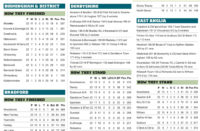The Professional Cricketers’ Association represents the interests of every player in the English game, from youngsters starting out on their first county contracts to superstars such as Joe Root and Ben Stokes. It means Daryl Mitchell, its chairman, is arguably the most powerful cricketer in the country.
That status has never been more evident than over the past year when Mitchell has been at the vanguard of holding the England & Wales Cricket Board to account over the implementation of their new competition – the Hundred.
He is also making sure the new tournament – and the bumper £1.1bn broadcast deal that runs from 2020 to 2024 – benefits all players, not just those drafted to take part in it.
As such Mitchell is heading up the negotiations over the County Partnership Agreement (CPA), which has seen the PCA urge the ECB to guarantee that all players receive a fair cut of the extra £1.3m counties will receive every year from 2020.
The PCA wants the salary cap – the total amount counties spend on wages – to rise, the salary collar – the minimum they must spend – to increase and a rise in the minimum wage for county players and a guarantee the ECB will enforce it. Currently there is widespread abuse of the system, with some counties paying youngsters as little as £3,000 a summer.
It’s not been an easy task for Mitchell, given he also has to hold down his day job as an opening batsman for Worcestershire.
Yet it’s one the 35-year-old has relished. “I’d say it’s the best time ever to be involved,” he said. “It’s been manic, extremely difficult at times but definitely rewarding – I’ve loved the responsibility.”
Mitchell’s initial two-year term is up next month but he is keen to be re-elected. “I’m definitely willing to carry on,” he said. “We’ve done a lot in the last few years but I feel like there’s still a lot to do. The CPA is still not done and I want to see this through to the new tournament in 2020. There’s a lot for me to get my teeth stuck into.”
Mitchell took part in the trial games for the Hundred last summer and was key in finalising the details of the playing conditions – a change of end after every 10 balls and a bowler able to deliver either five or 10 consecutive balls with a maximum of 20 per game.
Back in May, Mitchell had warned the ECB there would be no competition “without any players”. So does the Hundred, which starts next year, now have broad support amongst his members?
“I think so,” says Mitchell. “It’s going to happen and from the point of view of English cricket it’s paramount it’s a success. If it doesn’t work then we’re all in trouble, from players, supporters, ECB, counties. So I think it is important we try to get behind it. The format I think is pretty much there now having played it and the feedback we got from players was generally positive.
“There are still some questions to be answered from members who haven’t played it. So we need to turn their opinions around.
“But from our point of view the governance of these new teams is really important. We want all our members to have a fair chance of getting into this competition – meaning it’s important the people who are selecting these teams are independent. We don’t really want directors of cricket at counties having a really big say in the new teams. It’s obviously a conflict of interest.
“We just want to make sure everyone’s got a fair opportunity. We want the best white-ball players to be involved not necessarily somebody playing at the right county at the right time.”
The chief concern from supporters is the effect the Hundred will have on existing competitions. Mitchell admits domestic 50-over cricket – which will be played at the same time as the Hundred and not allow overseas players – will be badly affected. He is more optimistic over the future of the T20 Blast, which Mitchell won last year with Worcestershire.
“I think 50-over cricket is going to take a big hit,” he said. “There’s no getting away from that. Obviously, you’re taking the best domestic white-ball players away from that competition so that is going to be of a lesser standard. But as far the T20 Blast is concerned I see no reason why it can’t still thrive.
“Having two T20 competitions could have been damaging but a slightly different format for the new tournament aids the Blast in terms of it being the primary competition for T20. It should continue to go from strength to strength. I played in Finals Day last year and what an event that is. That’s something that needs to be protected at all costs.”
As for the season ahead with Worcestershire, relegated from the Championship last summer, Mitchell says: “There’s three going up this year so there’s a big opportunity to get back at the top table. Retaining the T20 would also be a hell of an achievement.”
Then there is England. Mitchell, an opener with a first-class average above 40, is often cited by county aficionados as a potential option to sure up England’s brittle top order in Test cricket. He may be 35 but so was Australia’s Adam Voges when he made his debut in 2015 and he ended up with a Test average of 61.87.
“Of course I’d be up for it, absolutely,” says Mitchell. “It was a dream as a 10-year-old and it’s still a dream, I’d love to have that opportunity. I think realistically age isn’t on my side, but if the call came I’d certainly grab the opportunity.
“You can always tell when an opener’s got a low score because my name crops up and you get tagged into things on Twitter so I know when someone’s failed without even looking at the scorecard. I’ll go out and perform the best I can and see what happens.”
CHRIS STOCKS / Photo: Getty images















